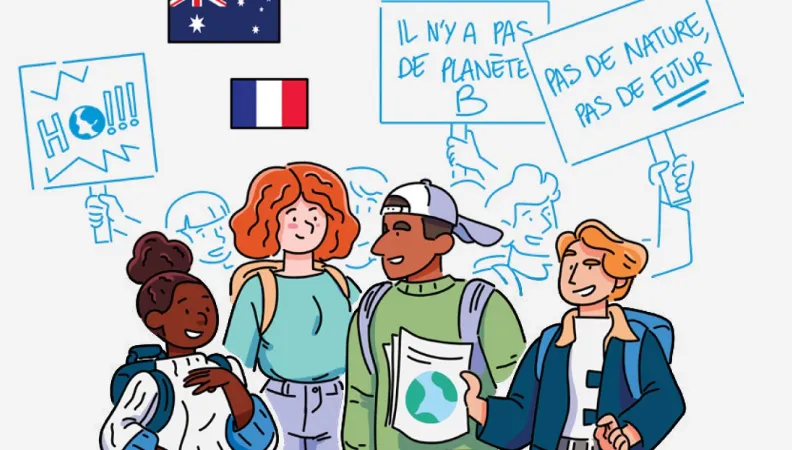Share the page
A Kit to Simulate International Negotiations on Biodiversity at School
Published on

International debates and negotiations over environmental issues can often seem a world away from real life. How to encourage young people to engage? France’s Ministry of Education, the French Office for Biodiversity and AFD have released a kit for secondary and high school teachers to raise awareness among students about protecting biodiversity through negotiation exercises.
What if role-playing raised awareness of the citizens of tomorrow about the importance of preserving biodiversity? This is what the Ministry of Education, Youth and Sport, the French Office for Biodiversity (OFB) and AFD are banking on by releasing an education kit for teachers in secondary and high schools to help them organize simulations of international negotiations on biodiversity with their students.
To promote its release, the Minister of Education, Jean-Michel Blanquer, went to Harteloire High School in Brest in January to meet second-grade students who were the first to try out this negotiation exercise.
The busy real-world calendar
Several major international events aiming to scale up the mobilization for biodiversity are scheduled in 2021. From the One Planet Summit on 11 January in Paris and the 15th Conference of the Parties (COP15) of the Convention on Biological Diversity, from 17 to 30 May in Kunming (China), to the congress of the International Union for Conservation of Nature (IUCN), from 3 to 11 September in Marseille – it’s going to be a full year.
These are all opportunities for the education community to raise the awareness of students about issues related to biodiversity and help them discover how they can get involved through role plays on international negotiations in the “Simulation of Negotiations for Biodiversity” kit.
Taking on the role of NGOs or government representatives
Students will be able to choose to act as 1 of the 23 stakeholders presented to familiarize themselves with their respective positions: countries like France or South Africa, international institutions such as the Intergovernmental Panel on Climate Change (IPCC), NGOs (WWF) and companies (Nestlé and Blackrock, for example). They will also be able to find out about themes related to biodiversity and negotiation through 6 resources sheets and discover 13 projects implemented in the field to preserve ecosystems, some of which have received financial support from AFD.
“We’ve made sure that we’ve provided material for students to understand the motivations of stakeholders and the key stages in an international negotiation,” says Stéphanie Beney, who is responsible for awareness-raising and education issues at AFD and contributed to the creation of the kit. “They’ll be able to have an innovative learning experience which will allow them to gain knowledge about biodiversity, especially about issues in certain countries they’ve heard little about, and develop skills such as in cooperation and argumentation.”
This education kit, which has been designed in partnership with the association Landestini, comprises five stages, which can be completed partially or totally, by spending a few hours or an entire semester using it. It is also possible to involve several schools in the same exercise.
Scaling up the exercise - to narrow the gap between mock sessions and reality
The objective of the Ministry of National Education, OFB and AFD is to increase the number of these negotiation simulation exercises with students in the run up to COP15. To support this dynamic, teachers will soon be able to follow training to get to grips with all the basics of these exercises. “AFD’s objective is to draw attention to the situation in developing countries, where there is sometimes a conflict between protecting biodiversity and exploiting resources,” says Stéphanie Beney. This education kit is a reminder, if there were still a need to do so, that every action counts everywhere.
